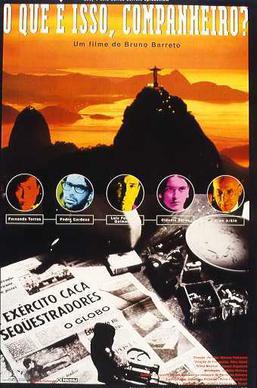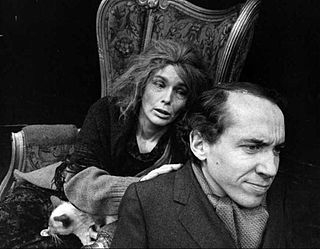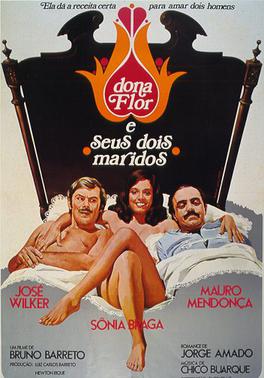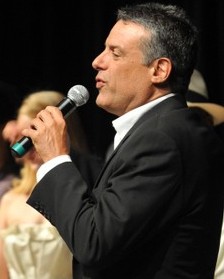Bruno Barreto | |
|---|---|
 Barreto in 2013 | |
| Born | 16 March 1955 Rio de Janeiro, Brazil |
| Occupation | Film director |
| Years active | 1967–present |
| Spouse | |
| Children | 1 |
Bruno Villela Barreto Borges (born 16 March 1955) is a Brazilian film director.
Bruno Barreto | |
|---|---|
 Barreto in 2013 | |
| Born | 16 March 1955 Rio de Janeiro, Brazil |
| Occupation | Film director |
| Years active | 1967–present |
| Spouse | |
| Children | 1 |
Bruno Villela Barreto Borges (born 16 March 1955) is a Brazilian film director.
Born in Rio de Janeiro, Barreto has been making feature-length films ever since he was 17 years old and remains one of Brazil's most accomplished and popular directors to this day. [1] His films vary widely, from light comedies like Dona Flor and Her Two Husbands (1976) and Bossa Nova (2000) to tense political thrillers like Four Days in September (1997). Four Days in September was entered into the 47th Berlin International Film Festival. [2] His 1973 film Tati was entered into the 8th Moscow International Film Festival. [3]
Other films Barreto has directed films include Carried Away and View from the Top . Barreto was married to actress Amy Irving from 1996 to 2005, with whom he made Bossa Nova and Carried Away. They had one son (Gabriel) together born in 1990. He is the ex-stepfather of Max Spielberg, Irving's son by her first husband Steven Spielberg.
According to Bloomberg News, [4] Brazilian prosecutors allege that Barreto razed protected jungle on Brazil's Pico Island to build a personal home. He was charged in 2006 for illegally clearing protected forestland. Barreto had agreed in a 2008 court proceeding to demolish said house and restore the land within two years. Yet, four years later, prosecutors claim that the house remains intact.
Bossa nova is a style of samba developed in the late 1950s and early 1960s in Rio de Janeiro, Brazil. It is mainly characterized by a "different beat" that altered the harmonies with the introduction of unconventional chords and an innovative syncopation of traditional samba from a single rhythmic division. The "bossa nova beat" is characteristic of a samba style and not of an autonomous genre.

João Gilberto was a Brazilian guitarist, singer and composer who was a pioneer of the musical genre of bossa nova in the late 1950s. Around the world, he was often called "father of bossa nova"; in his native Brazil, he was referred to as "O Mito".

Amy Davis Irving is an American actress and singer, who worked in film, stage, and television. Her accolades include an Obie Award, and nominations for two Golden Globe Awards and an Academy Award.

Four Days in September is a 1997 Brazilian thriller film directed by Bruno Barreto and produced by his parents Lucy and Luiz Carlos Barreto. It is a dramatized version of the 1969 kidnapping of the United States Ambassador to Brazil, Charles Burke Elbrick, by members of Revolutionary Movement 8th October (MR-8) and Ação Libertadora Nacional (ALN).

Giulia Daysi Gam is a Brazilian actress.

Priscilla Marie Pointer is an American retired actress. She began her career in the theater in the late 1940's, including productions on Broadway. Later, Pointer moved to Hollywood and making appearances on television in the early 1950s.
Midaq Alley is a 1995 Mexican film adapted from the novel by Egyptian writer Naguib Mahfouz, written by Vicente Leñero and directed by Jorge Fons. The film deals with complex issues such as gay and lesbian related topics, the lower-middle class of Mexico City, and the lives of many people.

Brazilian cinema was introduced early in the 20th century but took some time to consolidate itself as a popular form of entertainment. The film industry of Brazil has gone through periods of ups and downs, a reflection of its dependency on state funding and incentives.

Dona Flor and Her Two Husbands is a 1976 Brazilian comedy film directed by Bruno Barreto. Based on the 1966 novel of the same name by Jorge Amado, it takes place in 1940s Bahia and has Sônia Braga, José Wilker and Mauro Mendonça in the leading roles. The screenplay was adapted by Barreto, Eduardo Coutinho and Leopoldo Serran.

Bossa Nova is a 2000 Brazilian-American romantic comedy film directed by Bruno Barreto. It deals with several interwoven stories about people finding and losing love in Rio de Janeiro. It stars Amy Irving as an English language teacher named Mary Ann.

Carried Away is a 1996 American English language film directed by Brazilian Bruno Barreto. It is based on the novel Farmer by Jim Harrison.

Romeo and Juliet Get Married is a 2005 Brazilian film directed by Bruno Barreto and starring Luana Piovani and Marco Ricca. The film is loosely based on the William Shakespeare play, Romeo and Juliet, set in São Paulo amid two feuding soccer clubs, Palmeiras and Corinthians.

Simone Bittencourt de Oliveira, better known as Simone, is a Brazilian singer of Música Popular Brasileira (MPB) who has recorded more than 30 albums.
"Samba de uma Nota Só", known in English as "One Note Samba", is a bossa nova and jazz standard song composed by Antônio Carlos Jobim with Portuguese lyrics by Newton Mendonça. The English lyrics were written by Jon Hendricks. It was first recorded by João Gilberto in 1960 for his album O Amor, o Sorriso e a Flor.

Fábio Villela Barreto Borges was a Brazilian filmmaker, actor, screenwriter, and film producer. He was best known for directing O Quatrilho and Lula, o filho do Brasil, a biography based on President Luiz Inácio Lula da Silva's early life, which had been the most expensive film in the history of Brazilian cinema upon its release. Barreto slipped into a coma in 2009 after being involved in a car accident in Rio de Janeiro and, in August 2014, was reported to be in a minimally conscious state. He died on November 20, 2019, after almost 10 years in a coma.
Leopoldo Augusto Bhering Serran was a Brazilian screenwriter best known for the 1976 film Dona Flor and Her Two Husbands, based on the novel by Jorge Amado.

Francisco Tenório Júnior was a Brazilian musician and composer. Despite recording only one album as a solo artist, he was considered one of the best pianists of his generation, and his fame as a virtuoso creator has increased over the years.

Luiz Carlos Barreto is a Brazilian film producer and screenwriter. He has produced 50 films since 1962. He produced the 1966 film The Priest and the Girl, which was entered into the 16th Berlin International Film Festival. He also produced the 1969 film Brazil Year 2000, which won a Silver Bear at the 19th Berlin International Film Festival.

The 50th annual Berlin International Film Festival was held from February 9 to 20, 2000. The festival opened with The Million Dollar Hotel by Wim Wenders. Bossa Nova by Bruno Barreto, screened out of competition was the closing film of the festival. The Golden Bear was awarded to American film Magnolia directed by Paul Thomas Anderson. The retrospective titled Artificial People and dedicated to artificial beings and machines in the films was shown at the festival, screening films like The Golem: How He Came into the World and The Terminator. On its 50th anniversary the premieres of the films in competition at the festival moved from Zoo Palast to Theater am Potsdamer Platz located at Potsdamer Platz.
Tati is a 1973 Brazilian drama film directed by Bruno Barreto. It was entered into the 8th Moscow International Film Festival.